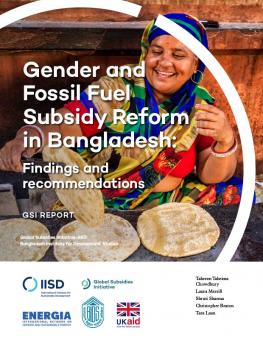
Gender and Fossil Fuel Subsidy Reform in Bangladesh: Findings and recommendations
The report examines from a gender perspective the impact of kerosene subsidies and their reform in Bangladesh. The report advocates that kerosene subsidy reform needs to be handled with care.
-
Official price cuts are not always passed onto consumers: more than 80% of surveyed households in #Bangladesh did not know that the official price of kerosene and 95% of households were not aware of the subsidy at all.
-
Subsidizing kerosene can lock households into using kerosene even though there are cost-comparable cleaner lighting alternatives available, like #solar PV lamps.
-
Kerosene subsidies are not working well for poor women in #Bangladesh: households pay above the official price, women are exposed to harmful fumes, and almost all want to shift to #solar or grid-based electricity.
Key Messages
- Kerosene subsidies are not working well for poor women in Bangladesh: households pay above the official price for the fuel, women are particularly exposed to harmful kerosene fumes, and almost all households want to shift to solar or grid-based electricity.
- Reallocating kerosene subsidies to grid- or off-grid alternatives would help the transition to clean energy—but it must be done carefully. Those continuing to use kerosene can ill afford the extra expense: households would reduce food and other expenses to pay higher kerosene prices.
- Potential kerosene price increases would appear to impact women and men equally. Both men and women need to be consulted on subsidy changes because women do most of the cooking and household chores, but men tend to make the decisions on energy purchases and buy the fuel.
The report examines from a gender perspective the impact of kerosene subsidies and their reform in Bangladesh. Its research included secondary data, household surveys (630 households in 2017) and focus group discussions.
The research found that potential kerosene price increases would appear to affect men and women equally in Bangladesh. In case of a kerosene price shock, women overall do not seem to be more vulnerable than men, with 74% of households reporting that all members would be equally affected. Because men purchase kerosene, a price increase may affect the income of men more than women.
Households are not experiencing the full benefit of the kerosene subsidy. Subsidizing kerosene is problematic because the fuel is easily diverted to illegal uses, and rent seeking frequently occurs along the supply chain, pushing up prices. More than 80% of surveyed households did not know that the official price is BDT 65 per litre, and 95% of households were not aware of the subsidy at all. In 2016, we found that the official price cut from BDT 68 to 65 per litre was not passed on to consumers.
Where households do receive subsidy benefits, continuously subsidizing kerosene can lock these households into using kerosene, though there are cost-comparable cleaner lighting alternatives available. The survey found that fuel costs families around BDT 210 per month, and solar PV lamps are available for around BDT 1,550 or BDT 65 per month (assuming a two-year life span). More advanced solar home systems with multiple light points can be available for slightly higher prices. These could be affordable for households if subsidies for solar lamps to replace kerosene lamps in very poor households could be considered alongside grid and mini-grid electrification efforts.
Kerosene subsidy reform needs to be handled carefully. In Bangladesh, poor families use kerosene for lighting. Any increase in the price of kerosene thus needs to be handled with care, especially if households have no opportunity to switch to electricity via solar or the grid for lighting needs.
You might also be interested in
Gender and Fossil Fuel Subsidy Reform in India: Findings and recommendations
The report examines the impacts of India’s subsidies to cooking gas—and their reform—from a gender perspective. It explores how liquified petroleum gas (LPG) subsidy policies and their reform affect women and girls in low-income households.
Gender and Fossil Fuel Subsidy Reform in Nigeria: Findings and recommendations
The report examines from a gender perspective the impact of kerosene subsidies and their reform in Nigeria, finding that kerosene subsidies did not work for poor women.
Environmentalists Should Pay Close Attention to the Racial Justice Movement
There are parallels and overlaps between climate justice and racial justice, as well as many lessons the climate movement can learn from this global moment of reckoning.
Better Targeted Subsidies Could Benefit Poor Women
Millions of dollars worth of fossil fuel subsidies could be better targeted by governments to benefit poor women.